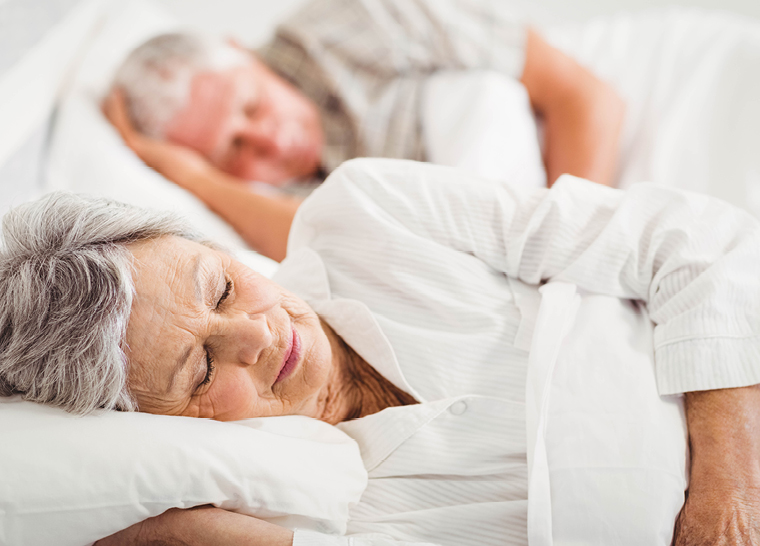
How have you been sleeping lately? You’re not alone if you’re experiencing insomnia, can't fall asleep, have trouble staying asleep or you wake up feeling tired. According to the National Sleep Foundation, more than 40 percent of people report sleep problems a few nights a week or more. That number is even higher for seniors aged 65 and up.
Sleep plays a crucial role in physical and cognitive health. Dr. Julie Carrier, a psychology professor at the University of Montreal and fellow of the Canadian Academy of Health Sciences, has learned about the effect sleep has on our systems. Here she offers seven tips for sleeping soundly, so stress doesn't disturb your sleep cycle:
1. Make sleep your best ally
Make sleep a priority by sleeping seven to eight hours per day, including naps. Some may need a little more or a little less, but 80 percent of older adults need about seven to eight hours of sleep per night.
Naps are fine for people who don’t have trouble drifting off to sleep or sleeping through the night, but they are not recommended for people who have trouble falling asleep or who wake up at night.
Sleep is important, but don’t spend more than seven or eight hours in bed when you’re not asleep.
If you can’t fall asleep or you’re having trouble going back to sleep, don’t lie awake for more than 30 minutes. Get up, leave the bedroom, do something relaxing until you feel sleepy or your eyelids feel heavy, then go back to bed again. The key is not to stay in bed if you’re having difficulty falling asleep.
2. Connect with people
Studies show the more social contacts you have, the easier it is for you to handle stress and the better your sleep will be. Stay connected by phone, email or video calls when you can’t see your friends and family in person.
3. Brighten your days
Light has a powerful effect on your brain: it enhances your mood and helps your biological clock, providing the signal to your body for a good night of sleep at the right time. Due to changes in the eye due to ageing, getting enough light can be especially important for seniors. If you can’t get outside for natural light, turn on lights inside to provide your brain with a strong signal during the day.
4. Avoid caffeine and alcohol late in the day and in the evening
Did you know caffeine decreases the amount of deep sleep we can experience, even if you only have one cup in the morning? And caffeine can make you more inclined to wake up more often during the night. Treating tiredness with coffee can create a vicious cycle of sleep difficulties.
Alcohol may seem like a good way to handle stress, because it tends to make us feel relaxed. While you may fall asleep easier, you’ll compromise the quality of sleep you’re getting, because alcohol causes fragmented sleep. Alcohol significantly shortens the duration of your paradoxical sleep (the period of sleep during which you are dreaming), a stage of sleep that's very important for balancing your mood and for several cognitive functions. (For more information, you can read about alcohol and sleep.)
5. Get moving
Studies show exercise helps us sleep better. By using energy during the day, we decrease wakefulness during the night and promote a deeper sleep. However, you should avoid rigorous physical activity just before bedtime. Daily exercise doesn’t need to be intense. When walking outdoors isn’t realistic due to weather, consider mall-walking. Get more ideas for seniors to stay active.
6. Try to reduce stress and worries before bedtime
Find a soothing way to slow down and unwind before bed with calming, quiet activities that give your brain and body a rest. That might include meditation, relaxing, reading, listening to music, doing yoga stretches, drinking herbal tea or shutting down your phone or computer at least an hour before bed, as the light from devices can interfere with your biological clock.
7. Create an environment for sleep
Keep your bedroom dark and quiet and at the optimal temperature for you. Restrict the bedroom for sleep and intimacy — it isn’t the place to do activities such as working. To protect your sleep from noise and disturbances, consider sleeping in a separate bed from your partner, especially if you or your spouse has a sleep issue such as sleep apnea or insomnia.
For more sleep advice, watch our national sleep webinar. And, book a tour at an elegant Amica residence with exceptional suites, dining, amenities, activities, personalized care, and more.
